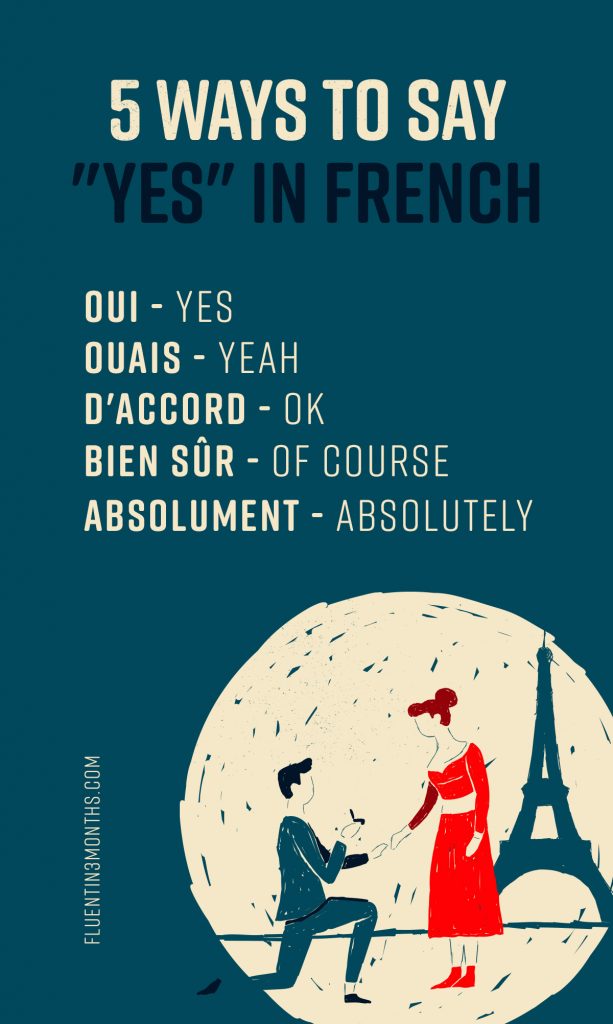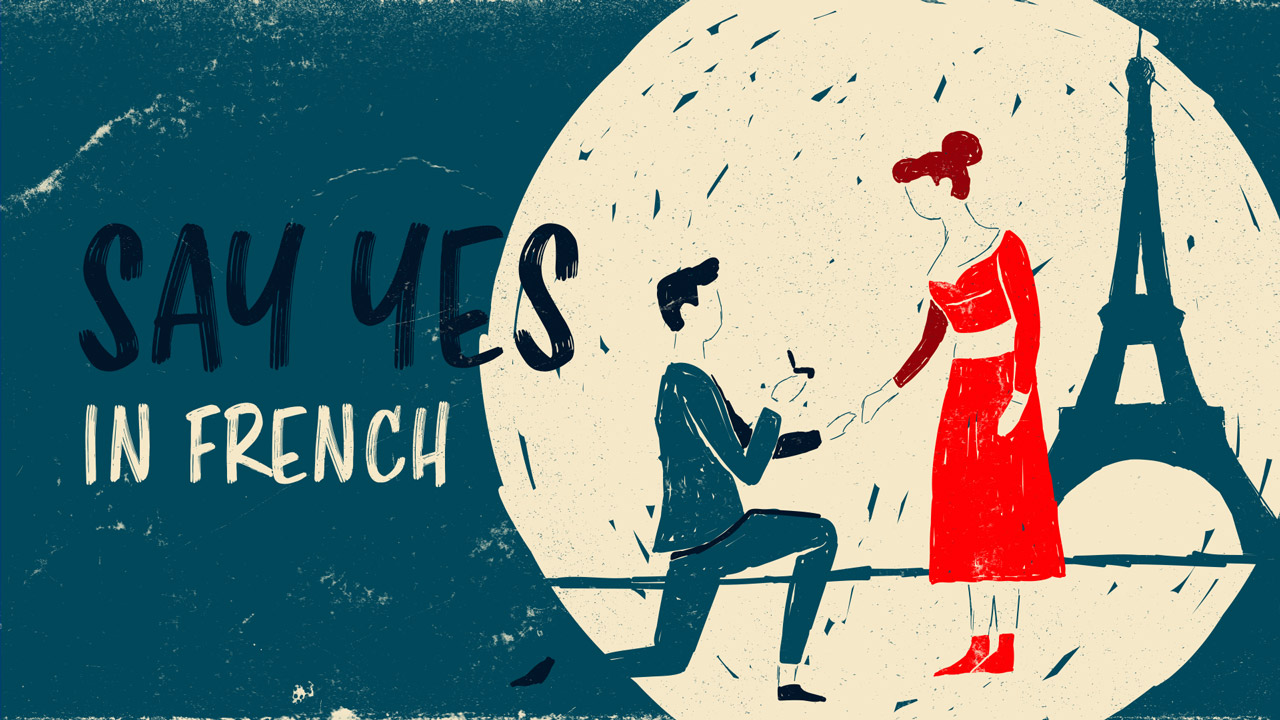17 Ways to Say “Yes” in French
“Yes” in French is oui.
And if you’re learning French and want to sound like a native speaker, there are so many more ways to say “yes” in French.
Think about how often you say “yes” in English, and how often you replace it with other words like “yep”, “yeah”, “okay”, “sure thing”, “of course” and “certainly”.
Here is a quick list of ways to say “yes” in French:
- “yes” in French: oui
- “yeah” in French: ouais
- “OK” in French: d’accord or OK (pronounced oké)
- “of course” in French: bien sûr
- “absolutely” in French: absolument
And “no” in French is non.
Read on to find out more about how to say “yes” in French, including:
- What oui means in French?
- What’s the meaning of si in French?
- How do you say “sure” in French?
I’ll even tell you about a famous French cartoon called Oui-Oui so you can improve your knowledge of French culture. I speak French as a native language, so you’re in safe hands here.
Are you ready? Oui?
Then let’s go!
How to Say “Yes” in French: Oui

You probably already know this… French people will answer your questions with oui, meaning “yes”!
But did you also know that the double oui is quite popular too?
French will say oui, oui to emphasize their affirmative answer. Think of it as how you would use “I do” in English when it’s not necessary: Oui, oui, j’aime ça! (“Yes, I do like it!”)
The Meaning of Mais Oui
Mais oui literally translates to “but yes”. This literal translation doesn’t make sense in English.
In most cases, mais oui is an interjection to say “that’s right” or to make the oui stronger. The mais (“but”) doesn’t translate in English when it’s part of this phrase.
Examples:
- Mais oui, c’est correct ! – “Yes, that’s right!”
- Mais oui, j’arrive – “Yes, I’m coming.”
Mais oui on its own can also mean “but of course.”
“Yes” in French – What Does Oui Mean?
Language lovers might have another question besides How do you say “yes” in French?
If you’re familiar with romance languages such as Spanish, Italian, and Portuguese, this question might be: Why don’t the French use: “si” like many other romance languages?
This is a very good question, with an even better answer.
“Yes” in Italian is sì. In Spanish it is sí. In Portuguese, sim. But in French, it’s oui.
So how come, if all these languages are derived from Latin, they don’t use the same word for “yes”?
Here’s why: there was no word for “yes” in Latin to start with. In fact, if you want to say “yes” in Latin, you’d need to use an affirmative phrase: sic est (“it is thus”), est (“it is”), hoc illic (“this is it”).
So when romance languages found themselves in need of a “yes”, they spun the Latin phrases or resorted to other languages. Sic est became si for Italian and Spanish, and sim for Portuguese. And French turned hoc illic into oc, oc ill, oïl, and finally oui.
The French language also adopted si, though only for specific situations. Let me tell you more about it.
What Does Si Mean in French?
We French like to be eccentric. This is why we have a “yes” to use in specific situations.
Si is the French “yes” to answer a question that was asked negatively.
You’d think that doesn’t happen often, but it surprisingly does. You would ask a French: Tu n’as pas faim ? (“You’re not hungry?”) and they’d answer si, meaning “yes”!
Examples:
- Ça ne va pas ? (“Are you not okay?”) → Si, ça va. (“I’m fine.”)
- Ne vient-il pas ? (“Is he not coming?”) → Si, il est en route. (“Yes, he’s on his way.”)
How to Say “Yeah” in French: Ouais
Why would you want to learn how to say “yeah” in French? It’s not “proper” language.
Well, think about how many times you use “yes” in English. Then think about how many times you use “yeah” daily.
Yeah, that’s what I thought.
Whether your go-to lazy yes is “yeah” or “yep”, you probably use it more often than “yes”. You would do the same in French with ouais.
You will also hear French saying mouais. It’s ouais but with a disinterested or doubtful tone.
How to Say “OK” in French: D’Accord
If you look for the French translation of “okay” on the Internet, the answer you will get is d’accord.
D’accord literally translates to “in agreement”, or more loosely to “alright” or “fine”. It belongs to the “proper” side of the French language.
If you’re looking for the more familiar “okay”, don’t look further. No, I mean it, don’t look further than “okay”. Simply using ok has become very popular among the French population. We pronounce it oké.
Abbreviations of d’accord are also common, the first one being d’acc. D’acc-o-dacc is less often used and serves more as an extra comical affirmation.
How to Say “Of Course” in French: Bien Sûr
Bien sûr in English would literally be “well sure” as bien is “good” or “well” and sûr is “sure”.
But bien sûr is the French equivalent of “of course”!
Note: Don’t forget the circumflex accent on top of the u! Sur without the circumflex accent is “on”, and the phrase wouldn't make much sense like this. As it’s just an accent, it’s common for French people to avoid it in texts and messages. So you’ll wonder: “then why should I make sure I remember it?” If French is not your native language, people will just assume you can’t write the word properly and correct you.
How to Say “Sure” in French: Pour Sûr
Pour sûr is literally “for sure” in English. It’s another way to say bien sûr.
You might not have heard much about pour sûr, and maybe you’re asking yourself whether you have to use it in a colloquial or formal setting. Let me tell you, it’s hard to know.
While pour sûr is a bit too uptight to be everyday language, it’s not an expression you’d use in a formal conversation either. It kind of hovers in between and that’s probably why it’s not commonly used.
If you want to say “sure” as in the more familiar way, use ouais or OK.
How to Say “Absolutely” in French: Absolument
After learning to say “for sure” in French, you have to learn how to say “absolutely”. You never know how affirmative you need to be in future situations.
In French, “absolutely” is absolument. Isn’t it similar to the English word? You’re lucky, it makes it even easier to remember!
If you like French grammar (or at the very least are familiar with it), you’ll recognize the construction of the adverb: adjective (absolu, “absolute”) and the suffix -ment.
Words that are the same in English and French are called cognates. There are hundreds of French words that you can learn this way. It’s a quick way to build your French vocabulary.
How to Say “It's Okay” in French: Ça Va or C’est Bon
How you say “it’s okay” in French depends on the situation and context.
Some ways to say “it’s okay” in French include ça va or c’est bon.
Ça va literally translates to “it goes” in English. It’s the short version of ça va bien (“it’s going well”). C’est bon means “it’s good”.
As I mentioned earlier, French people do say ok. You might hear them saying c’est ok as well.
How to Say “To Nod” in French: Acquiescer
Sometimes, you don’t even need words to say “yes”. You just have to nod!
In French, “to nod” is acquiescer.
Acquiescer belongs to the first group of French verbs, those that end in -er. As verbs of the first group are always regular, the conjugation of acquiescer is simple (for French conjugation).
However, watch out for the ç cedilla. It appears in front of the vowels a, o, u but not e, i because they already make the c soft. This is why there is no ç in the infinitive of acquiescer.
| Passé Simple | Imparfait | Passé Composé | Présent | Futur | |
|---|---|---|---|---|---|
| je – I | j'acquiesçai | j'acquiesçais | j'ai acquiescé | j'acquiesce | j'acquiescerai |
| tu – you (singular and informal) | tu acquiesças | tu acquiesçais | tu as acquiescé | tu acquiesces | tu acquiesceras |
| il – he / elle – she / on – we (informal) | il/elle/on acquiesça | il/elle/on acquiesçait | il/elle/on a acquiescé | il/elle/on acquiesce | il/elle/on acquiescera |
| nous – we (formal) | nous acquiesçâmes | nous acquiescions | nous avons acquiescé | nous acquiesçons | nous acquiescerons |
| vous – you (plural or formal) | vous acquiesçâtes | vous acquiesciez | vous avez acquiescé | vous acquiescez | vous acquiescerez |
| ils – they (masculine or general) / elles (feminine) | ils/elles acquiescèrent | ils/elles acquiesçaient | ils/elles ont acquiescé | ils/elles acquiescent | ils/elles acquiesceront |
You can also use the phrase hocher la tête to say “to nod”. Hocher la tête also sometimes means “to shake one’s head”.
How to Say “Thumbs-Up” in French:
A lot of our communication as humans depends on body language, so it only makes sense that we have more than one gesture to show that we’re saying “yes”.
If nodding isn’t your thing, chances are you prefer using the “thumb-up” to say yes. In French, a “thumb-up” is un pouce levé.
Funnily enough, the pouce levé is also called the le pouce anglais (“English thumb”). It’s contrary, the pouce * (“thumb-down”) is also known as *le pouce allemand (“German thumb”).
Some French people also call it the pouce levé a pouce en haut or pouce vers le haut.

Other Ways to Say “Yes” in French
Here are a few more ways to say yes without actually saying “yes” in French:
- Affirmatif – “affirmative”
- Compte sur moi – “count on me”
- Comptez sur moi – formal or plural “count on me”
- Ça roule – “okay” or “smooth”, literally “it rolls” (familiar expression)
- Ça marche – “okay” or “smooth”, literally “it walks” (familiar expression)
Oui-Oui – France’s Noddy Detective
This section isn’t much more than an excuse for me to talk about a popular cartoon in France.
Have you heard of Oui-Oui? Or maybe you know him as Noddy?
Still not ringing a bell? Maybe you’ll recognize him then:
Oui-oui was created in 1949 by British author Enid Blyton and illustrated by a Dutch artist named Harmsen van der Beek. France saw him for the first time in 1962 as a part of a book. He has since become one of the core cartoons for young French children.
Noddy is a toy detective from the town of Miniville (“Toyland”) and his signature characteristic is his head that nods easily. That’s why his name in French is “Yes-Yes”!
Now You Know How to Say “Yes” in French, It’s Time to Part Ways”
Now you know how to say “yes” in French just like a native speaker. No one will catch you off guard anymore.
Are you happy? Oui!
Do you feel confident with your knowledge of French words for “yes”? Bien sûr!
Are you ready for more French learning? Absolument!
That’s what I wanted to hear!
Benny Lewis has put together a post for learners like you who never want to stop discovering and improving. It’s a list of the best resources there are on the Internet to learn French. Check it out, I’m sure it has what you need to take your French to the next level.



Social